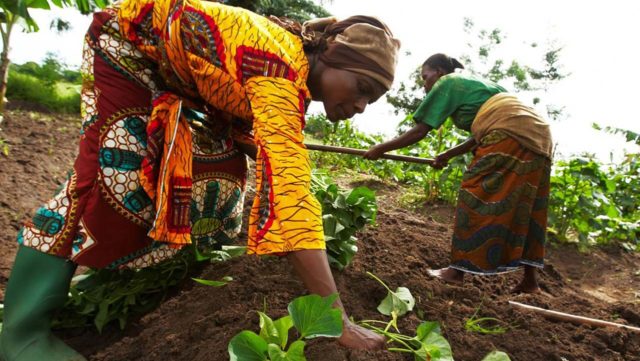Recession: CBN unveils plans for non-interest loan in ABP, others
Farmers
…Targets N432 billion for 2020 wet season
To avert another round of recession in the country, the Central Bank of Nigeria (CBN), has unveiled plans for a framework for the integration of non-interest window in all its intervention programmes, particularly the Anchor Borrowers’ Programme (ABP) and the Targeted Credit Facility (TCF).
The Bank also plans to fund the value chains of nine commodities to about N432 billion in the 2020 wet season.
This move is to support households and Micro, Small and Medium Enterprises (MSMEs) affected by the COVID-19 pandemic, the CBN Governor, Godwin Emefiele, said at a stakeholders’ meeting to review the successes recorded under the ABP, and the strategies for the 2020 agricultural wet season on Thursday.
He explained that the creation of a non-interest window followed appeals by concerned stakeholders for farmers across the country to also be considered for funding under the non-interest window.
While revealing that work had been concluded on the funding document, he said the policy would be issued shortly, outlining how farmers under the category could apply and benefit from the CBN’s agricultural programmes.
Emefiele was jointly represented by the duo of the Bank’s Director, Corporate Communications, Isaac Okorafor, and Director, Development Finance Department, Yila Yusuf.AdvertisementAdvertisement
Okorafor reiterated CBN’s commitment to aggressively fund its agricultural programmes this wet season, and spur farmers along select crop value chains to prevent the country from sliding into a recession, as is currently being experienced in some major economies of the world.
Speaking on the Targeted Credit aimed at alleviating the impact of the coronavirus on individuals and small businesses, Okorafor said the Bank is determined to push the economy to ensure Nigeria does not experience consecutive quarters of negative growth.
Accordingly, he said Emefiele had directed CBN’s Development Finance Department as well as the NIRSAL Micro-Finance Bank (NMFB), to fast-track the approval process for loans, to restore businesses and livelihoods.
In his remarks, Yusuf said the target for the 2020 agricultural wet season is to advance about N432 billion, through the participating banks in the value chains of nine commodities.
He also disclosed that over 1.1 million farmers, cultivating over one million hectares of farmland, were expected to benefit from the loans that will help produce a collective output of 8.3 million metric tonnes.
According to Yusuf, the focus for this wet season is to ensure the provision of improved seeds to incentivize farmers to return to their farms, adding that the value chain approach was adopted across all the commodities to ensure that every player along the entire chain, from the farmers through to the processors, was financed.AdvertisementAdvertisement
He said the Bank’s funding of the ABP for the season was the highest since its inception in 2015, adding that this was quite significant considering the successes recorded in the 2019 season that contributed to shielding Nigeria from any food shortages, particularly rice, in the heat of the global lockdown.
During this period some major producing countries of staples, such as rice, closed their silos and halted their export.
Also speaking at the meeting were the presidents, Rice Farmers Association of Nigeria (RIFAN), Aminu Goronyo; National Cotton Association of Nigeria (NACOTAN), Anibe Achimugu; Maize Association of Nigeria (MAAN), Bello Abubakar; and the Maize Growers, Processors, and Marketers Association of Nigeria (MAGPMAN), Dr. Edwin Uche. They attested to the success of the ABP, saying it had enhanced the value chains of their respective commodities.
While pledging their support to the continued implementation of the Anchor scheme to generate employment and create wealth, they also promised to ensure that the loans collected by farmers were promptly recovered to sustain the programme.
